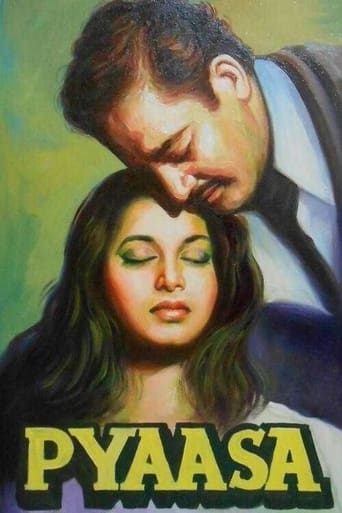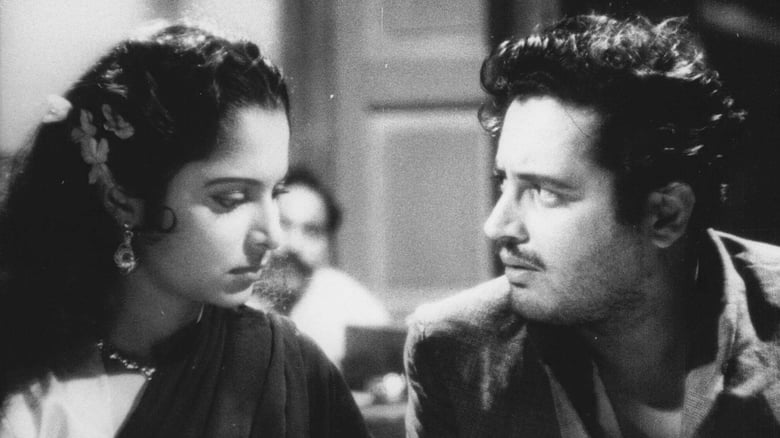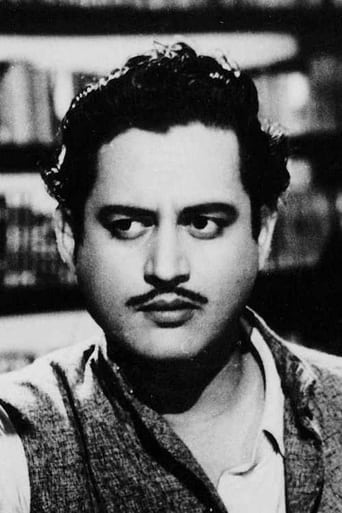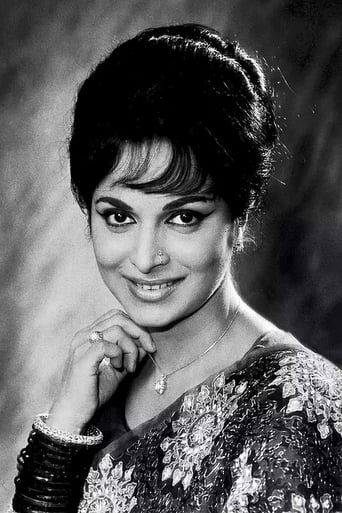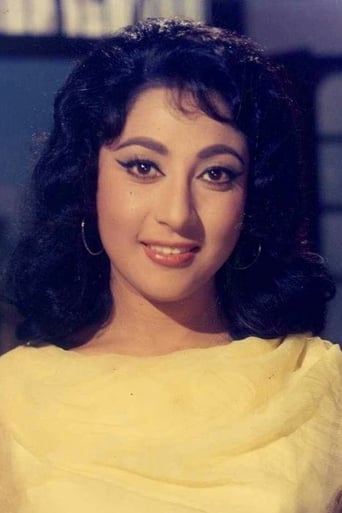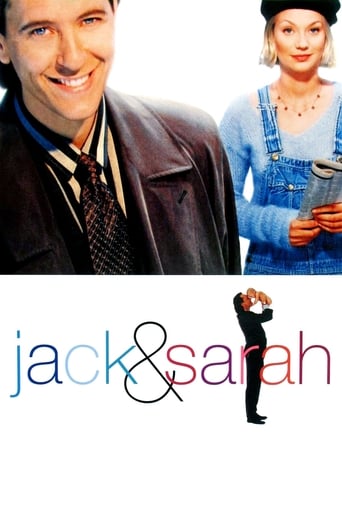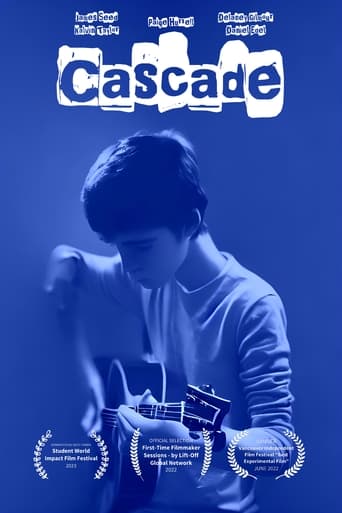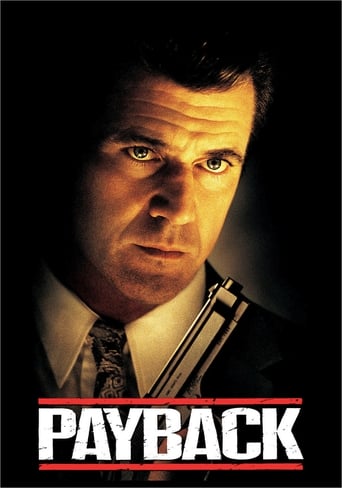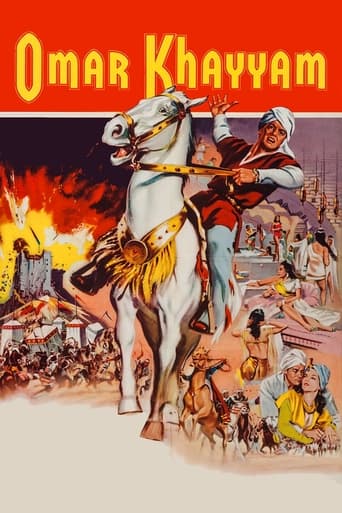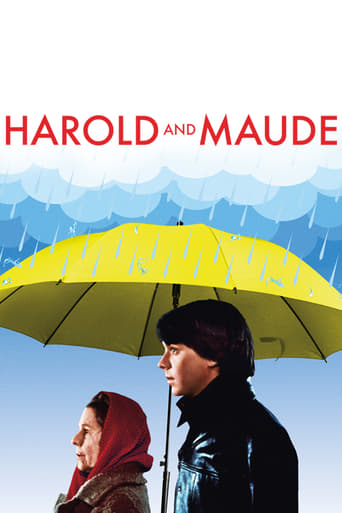Pyaasa (1957)
Vijay, a destitute poet, searches for true love while attempting to get his work published. With the assistance of two women in his life, his dream comes true - but at a cost that causes Vijay to rethink his worldview.
Watch Trailer
Cast


Similar titles
Reviews
A lot more amusing than I thought it would be.
Pretty good movie overall. First half was nothing special but it got better as it went along.
Fun premise, good actors, bad writing. This film seemed to have potential at the beginning but it quickly devolves into a trite action film. Ultimately it's very boring.
It's an amazing and heartbreaking story.
This film is about a poet named Vijay(played by Guru Dutt).He is an innocent person and thus,is unsuccessful.The film tells about his sadness and other problems.The film tells about his love with Meena(played by Mala Sinha)who leaves him to marry a rich publisher(played by Rehman).Then there is a prostitute Gulabo(played by great actress Waheeda Rehman) who sings a song written by Vijay(Jaane kya tune kahi sung by Geeta Dutt).She then comes to know about it and starts liking Vijay.Some time later in the film,Vijay dies in a train accident and his poems are given for publishing by Gulabo to Meena and he becomes famous in some time.Now its found that it was someone else who died in the accident and Vijay is in a mental asylum for claiming that he is Vijay.The actual depressing things start then.What I liked in the movie? Music by SD Burman with Lyrics by Sahir Ludhianvi was the first thing I liked in the movie.Every song in the movie is great. Guru Dutt, Mala Sinha and Waheeda Rehman are great in lead roles,not to forget Rehmaan and Johnny Walker in the side roles which were equally important What I didn't like? Practically,there is nothing to dislike in this movie except the pessimistic tone of the movie.It was too pessimistic except for the two songs--Hum Aapki Ankhon me and Sar jo tera Chakraye.
Pyaasa is a 1957 Drama movie directed and produced by arguably the greatest Indian filmmaker of all time, Guru Dutt. Dutt, who pioneered the integration of songs in the movie's narrative as well as the use of close-up shorts in Indian Cinema, is ubiquitously regarded as one of the most influential film-makers of his time. Dutt's avant garde works and his unique style of film-making have been a subject of discussion in various acting and film institutes all across the globe for well over five decades. In Pyaasa, Guru Dutt presents the poignant tale of a struggling poet ostracized by a hypocritical society that faces no qualms in immortalizing the dead, but finds it outlandish to exalt the living. Vijay, educated yet unemployed, epitomizes the hapless state of the Indian youth in the post-colonial India. A consummate artist, Guru Dutt was equally brilliant behind the camera as he was in front of it: his attention to detail as a director matched his ability to emote as an actor. Guru Dutt and his team were keen on casting the king of tragedy, Dilip Kumar in the lead role for Pyaasa, but Dutt himself had to fill in the shoes when an agreement couldn't be reached.Pyaasa, widely regarded as Dutt's magnum opus, represented a departure from the traditional style of film-making in the Indian Cinema, blurring the demarcations that hitherto separated art cinema from commercial cinema. With Pyaasa, Guru Dutt demonstrated for the first time, to both his audience and fellow film-makers, how a balance could be struck between creative aspirations and commercial requirements - a success formula that was completely unknown at that time. Pyaasa, along with Guru Dutt's autobiographical Kaagaz Ke Phool, is currently included in the list of all time greatest motion pictures, both by Time magazine's "All-TIME" 100 best movies and by the Sight & Sound critics' and directors' poll.Pyaasa's intense and thought-provoking plot emphasizes on the fact that every human being, howsoever wretched or deplorable, is capable of love and worthy of being loved. The movie also underlines the root cause of human plight: poverty, not of material but of thought. Guru Dutt, touted in film circles as India's Orson Welles, demonstrates in Pyaasa the might of words - an embodiment of human thought - as great stimuli for change. The stark theme of Guru Dutt's Pyaasa is highly reminiscent of Dostoevsky's Notes from Underground. The vituperative and somber tone of Vijay's poetry seems to betray the same sense of angst and guilt as that of Dostoevsky's Narrator.Vijay's apparent anger for society's hypocritical rigidity is indicative of his inner sense of chagrin for having failed in his efforts to be loud enough to be heard and for quietly accepting his fate. Pyaasa also highlights the complexities associated with the human psyche that give rise to unpredictability of behavior: Vijay, rejected by his lover (Mala Sinha) and family, is embraced by a prostitute, Gulabo (Waheeda Rehman) who is moved by the power of his poetry. While the world finds her despicable and treats her with contempt, she seems to be the only soul capable of reciprocating love and respect. It's both touching and mesmerizing to witness two pariahs of the society finding refuge in each other's abject solitude.As far as the source of Pyaasa's plot is concerned, it's surmised that the movie's story is loosely based on renowned lyricist Sahir Ludhianvi's failed affair with poetess and writer Amrita Pritam. Sahir Ludhianvi's evocative poetry adds real charm to S. D. Burman's soothing music, and indeed it's this synergy that livens up the movie's tempo in spite of its somber theme. The relentless questions that the movie poses to the viewer have the power to make a Polymath look askance at the pool of his knowledge and a Saint jitter in morbid terror. V. K. Murthy's detailed cinematography inexplicably reminds one of Gregg Toland's groundbreaking, brilliant camera-maneuvering techniques in Welles' magnum opus Citizen Kane. The movie's relatively inexperienced cast, hand-picked by Guru Dutt himself, makes most of the opportunity at disposal with almost everyone delivering a memorable performance with special mention of Johnny Walker, Mala Sinha, Waheeda Rehman and Mehmood. The Hindi word 'Pyaasa' translates to 'Thirsty' in English; the movie's plot is highly symbolic of the thirst that troubles the protagonist in form of his yearnings, which gradually take the form of angst and malaise owing to society's indifference and his continuous failure.Overall, Pyaasa is a formidable work of cinema that presents cinema at its finest by maintaining a delicate balance between art and entertainment, thereby serving to be a unique specimen of filmmaking. The movie also marked the beginning of somewhat scandalous association between Guru Dutt and Waheeda Rehman (a lot has been conjectured about Dutt's extra-marital relationship with Rehman... it's still a mystery whether the lovelorn Guru Dutt died of an accidental drug overdose or did he commit suicide). Pyaasa fulfills in its absolute sense the true purpose of cinema: to entertain and enlighten simultaneously. The movie is a must watch for all those who understand and appreciate thought-provoking cinema, and is a great means to get acquainted with Guru Dutt's oeuvre and also with the Classic Indian Cinema.(This review was first published at A Potpourri of Vestiges)
My favourite Movie till Date.This is my first movie I am going to review coz this is the movie that changed my view my aim and defined me. It is the most special movie for me. It's the story of a jobless poet Vijay (Guru Dutt). His anguish his pain his hope and his wish for a better world. His vision is what is depicted. It's a vision of every true poet and its the pain that he has seen made him a better poet. He wants his poems to be published and they will never be taken by the publishers.No, no the story shall not be revealed but I would like to discuss the characters and the technicalities involved in the movie.Characters are endearing and realistic and relatable too. I can identify myself with Vijay, an abandoned poet. And putting myself in each one's shoes I realized that the way the character reacted, I too would react in the same way. The acting is just top notch with Waheeda Rehman playing Gulab, Mala Sinha playing Meena, Rehman playing Ghosh all are remarkable in performances.Abrar Alvi's dialogue, S D Burman's music and Sahir Ludhianvi's poetry (no not lyrics it is poetry of a very high degree) complement the magnanimous vision of Guru Dutt. And everything is perfect.Right from first frame till the very end, each frame seems to have a meaning much greater than I could comprehend. The lighting and the visuals just suit the vision and thus give a feel into the psyche of each character.Damn it. I am not reviewing, I am just praising it and no praise how great is equal than this movie being watched many times over.Rating: 5/5
Guru Dutt was indeed a visionary, so many of his ideas are much ahead of not only those times but our times as well. Pyaasa is one of his most acclaimed movies. One can see why. This is the story of Vijay, an unemployed poet who struggles through his loneliness, lack of job, and 'good-for-nothing' image. Having left his house where his brothers maltreated him for the same, he wanders in the streets. He puts his heart and soul into writing poems but then no one takes notice of them and they remain unpublished. The story follows his acquaintance with a young prostitute named Gulabo and his renewed meeting with his college sweetheart Meena who left him to marry a wealthy man. What happens when an aimless and embittered Vijay generously gives his coat to a beggar is what takes the whole thing much further.Being a poet's story, the film is appropriately and incredibly poetic in tone, with amazing dialogues bringing so much depth and finesse to it. Today, some of them have become unforgettable sayings. Dutt's direction is excellent. He pays attention to the smallest of details, keeps the film consistently realistic, ultimately managing to build a wonderfully captivating and engaging picture. True to its musical style, the narrative is full of songs, and never do they take away from the efficiency of the script. They actually contribute to it as they either enhance the emotional impact or relieve the intensity. It is this rare mix of melodious numbers and serious, atmospheric proceedings that marks this film's success. The cinematography is very effective, and, just like the songs, it often manages to capture the characters' state of mind.One of the most impressive aspects about this film, among others, is the matter-of-fact style of story-telling, which is still missing in Hindi films today, as well as Dutt's portrayal of relationships. The character of Gulabo, a golden-hearted prostitute is very impressively atypical. She is neither exaggerated and vulgar nor over-generous. She is pretty much a real good-hearted person, who does have her share of toughness, but she is never presented as a poor victim. The interaction between Vijay and Gulabo is very credible as it is never saccharine or sentimental and it lacks any sort of 'love against all odds' clichés. We actually never see if he really loves her. She, however, loves him unconditionally which has got to do a lot with the fact that she's a fan of his poems and that he's one person who shows respect to her.Mala Sinha's Meena, however, is the complete opposite. As Vijay says, "for her, love is a hobby and she can barter it for material comfort." But I love this character, because she looks at life from a sane and practical perspective. She is greedy, but she is honest enough to admit it, something that suits her persona brilliantly. In the conversation scene, which is one of the very best in the film, she directly tells Vijay she did not want to marry an unemployed man without any future. She says the memorable line, "in life, besides poetry and love there's hunger". Whether you agree or disagree, that's true. Another highly precious and probably the most haunting aspect in the entire film is the portrayal of Vijay's relationship with his loving and caring mother. It is given very little screen time, and yet it's so strongly impactive and touching.Acting-wise, Guru Dutt is excellent in an author-backed role which only he could play given he had the idea of how it should have been done. He gets into the skin of the character, and remains thoroughly in-sync with it. Mala Sinha is brilliant as she is in probably every film and she displays the negative shades of her role as well as her inner compassion very well. It is Waheeda Rehman, however, who shines the most with a role that allows her to grow through the film and draw the audience's sympathy with her heartfelt and authentic portrayal. Rehman, Johnny Walker and particularly Leela Mishra as Vijay's mother, provide excellent support. "Life's real joy lies in making others happy", a memorable line by Dutt, and that's what this film is all about. Pyaasa is overall a poignant and moving classic, highly recommended.

